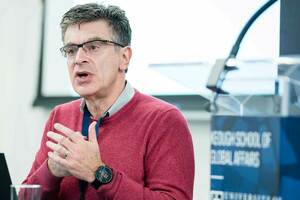
When Professor Laurie Nathan, director of the Kroc Institute Mediation Program, was a South African graduate student, he was engaged in the anti-apartheid struggle – and fiercely opposed to mediation. He believed that mediators should get off the fence and join the struggle.
“We wanted to defeat the apartheid regime,” said Nathan. “We were not interested in mediation.”
Following the end of apartheid in South Africa in 1994, however, not long after Nathan earned his Master's degree in Peace Studies from University of Bradford, his perspective on mediation underwent a transformation. He joined the Centre for Conflict Resolution at the University of Cape Town, where he developed a deep interest in the art of mediation. "I found it fascinating," Nathan reflected. "From political and intellectual standpoints, as well as ethically and psychologically, mediation is an extremely challenging endeavor."
Over the ensuing years, Nathan served as the director at the Centre, and his research and practice gradually shifted from focusing on security sector reform in South Africa, to encompassing a broader peacemaking and peacebuilding scope across the African continent. Notably, he played a pivotal role as a member of the African Union Mediation Team for Darfur during the civil war in Sudan that unfolded in the early 2000s. As his influence increased, so did his argument – that international mediation should be professionalized.
"Mediation is a specialized field with a distinct body of knowledge, tactics and techniques," Nathan emphasized. "It requires training, regardless of one's natural talents."
Nathan's journey at the University of Notre Dame commenced in 2017 when he became a visiting fellow at the Kroc Institute for International Peace Studies. This was a significant juncture, coinciding with Asher Kaufman's inaugural directorship of the Institute and the retirement of John Paul Lederach, one of the only faculty members at the Kroc Institute who studied and taught mediation. Establishing a mediation program aligned perfectly with Kroc Institute's 2018-2023 strategic plan, offering Nathan an ideal opportunity to continue his career on a permanent basis at Notre Dame. "It was and still is a dream job," Nathan enthused.
“Two of our core objectives are to produce high-quality scholarly research and policy research that policymakers find useful," he affirmed. In this regard, Nathan has worked closely with the United Nations, the European Union and the governments of Germany and Switzerland.
A third objective of the mediation program is to support mediation and dialogue efforts in the field. "Since joining Kroc, our focus has included North Macedonia, Kosovo, Sudan, South Sudan, and Ethiopia, all of them in the midst of serious conflict,” said Nathan. The mediation program also houses the Afghanistan Program for Peace and Development (AfPAD), where Nathan supports its advisors and program leader, Aref Dostyar.
The mediation program also undertakes teaching, “which I love," said Nathan, and offers courses at Notre Dame on international mediation and community mediation. He has established an annual international mediation Ph.D. course in collaboration with the Peace Research Institute Oslo (PRIO). This course welcomes students from Notre Dame and Ph.D. students from around the world.
On a local level, Nathan has partnered with the Office of Community Initiatives with the City of South Bend. Here, he trains community activists in crisis intervention, a form of mediation employed in situations of imminent or actual violence.
"It has been very rewarding, and the program has expanded each year," said Nathan. In future iterations, he hopes to integrate this type of training with community schools, as well.
To aspiring activists, Nathan suggests selecting a cause that resonates with them. "Get involved in the area that ignites your passion. Channel that passion into something constructive."
Often encountering students and activists who feel overwhelmed or despondent about current events, Nathan offers this advice: "If you have the determination, you will find a solution.” Certain issues, however challenging, are not insurmountable. "No one guarantees an easy victory," he acknowledged. "But if we do not engage in activist struggle, the forces of injustice prevail. The forces of good may not win every time, but we will win some of the time."